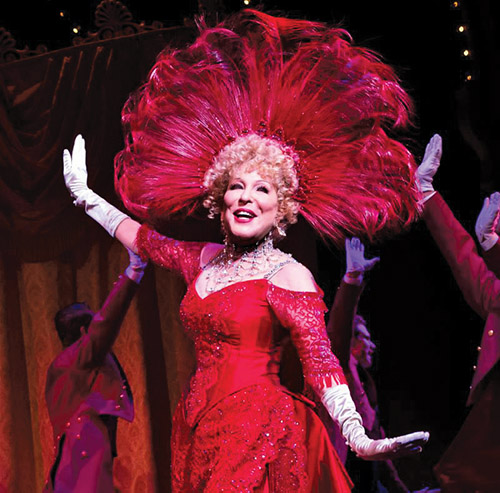
Fanny Brice, Sophie Tucker, Barbra Streisand … and now, Bette Midler. Not traditional American beauties, these Jewish self-made powerhouses project a magnetically endearing combination of warmth, humor and respectable sex appeal. They were born and raised in far less than comfortable circumstances. Through their talents, hard work and persistence, they achieved fame, fortune and admiration from fans all over the world. It is Bette Midler, however, who is probably the most beloved of these Jewish stars. The excitement she creates is palpable. She is a showstopper even before she opens her mouth to sing. In “Hello, Dolly!” adoring audiences rise to their feet to cheer and applaud. Such is her charisma.
Midler’s is perhaps the most authentic incarnation of Dolly Gallagher Levi, a widow, still missing her husband, Ephraim. Worn down by age, worry and work she is eager to wed for both love and money. When the play begins, Dolly, a Jill of all trades, including matchmaker, is off to Yonkers to do some matchmaking. Before long the opportunist has set her sights on one of her clients. The lucky fellow is the grouchy tightwad “half-millionaire” Horace Vandergelder, portrayed with great aplomb by David Hyde-Pierce. This arrogant misogynist, also an opportunist, is seeking a wife.
Marriage at the turn of the century was rather a practical necessity with social benefits, especially for men. When gendered division of labor was far more marked than it is today, men relied on women to do the cooking, cleaning, laundry, sewing and other assorted chores, as well as the bearing and raising of their children. Wives had few rights. They could inherit their husband’s estates, if they survived multiple pregnancies and childbirths. Most didn’t, medicine being far less safe than it’s become. Aside from providing respectability, women were, in essence, unpaid domestic workers. In addition, wives were expected to help out on the farm or the family business.
A force of nature and determination, the relentlessly energetic, resourceful and charming Dolly Levi beguiles Horace into chasing her until she catches him. In this revival of the 1964 hit, it’s a feel-good ending to what has been feel-good entertainment since the orchestra played the first notes of the overture. The cost of the tickets is frightfully high, but when one compares them to the cost of Metropolitan Opera tickets they seem reasonable for such a beautifully opulent production. The singing, including Midler’s raspy voice, may not be operatic, but the staging is fabulous. Not only is the character of Dolly phenomenal, but Bette Midler herself is a phenomenon. The Jewish girl from Hawaii is amazing, in the truest sense of the word. Her rapport with audiences, her delivery of lines and her skill at pantomime are unparalleled. Midler’s performance in the Harmonia Gardens eating scene is sure to become a classic that will serve as a lesson in vaudeville for aspiring actors.
“Hello Dolly!,” by composer Jerry Herman, with a book by Michael Stewart, is based on Thornton Wilder’s play “The Matchmaker,” which originated as a one-act play in Austria. It’s a farce with a pithy message, from Dolly’s dearly departed Ephraim, “Money is like manure. It does no good unless you spread it around.” The producers seem to have taken those words to heart and spared little expense in providing entertainment for theatergoers. Jerry Zaks has created a sensational piece of theater, and the marvelous stage sets, gorgeous costumes, choreography and an orchestra and cast that perform impeccably is Broadway at its very best. No wonder it received so many Tony nominations and awards, with Bette herself receiving a well-earned Tony.
By Barbara Wind
Barbara Wind is the director of the Holocaust Center of Greater MetroWest.









